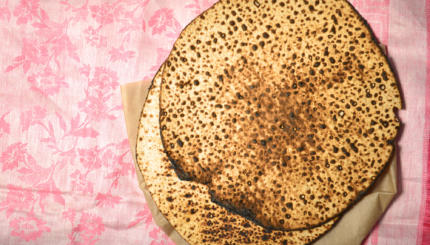The following reading is intended to be recited during yahatz, the breaking of the middle matzah. It is provided by the United Jewish Communities Rabbinic Cabinet.
Passover is the great Jewish family holiday–but with a critical message about our ethics and values.
We eat the karpas, the green vegetable–and recall our concern for the environment.
We dip into the salt water of tears–and remind ourselves to care for the oppressed.

Help us keep Jewish knowledge accessible to millions of people around the world.
Your donation to My Jewish Learning fuels endless journeys of Jewish discovery. With your help, My Jewish Learning can continue to provide nonstop opportunities for learning, connection and growth.
We eat the bitter herbs–and sharpen our concern for the stranger.
We taste the matzah, the bread of affliction–and feel the memories of our servitude to Pharaoh.
We note the roasted egg, symbolic of the extra offering in the Temple in ancient days–and ask ourselves, what are our own sacrifices?
Passover is so real and tangible, because we not only taste our freedom, but we also resolve to work for the liberation of all people. It is a time to ask ourselves: What are we doing to care for those in need?
Can we reach out and assist with our tzedakah, our charitable contributions, or through our acts of loving-kindness?
Let us now take the middle matzah and divide it in half. As we break this matzah and set it aside, we link ourselves symbolically with all Jews throughout the world, especially those who have lived under the heel of the oppressor.
Our meal will not conclude until the missing piece of matzah is found and returned to the table. The matzah, when restored, shows the desire of our people to be together as one, at peace. As Jews, we are a people of sacred fragments; we need help from God to bond together in everlasting unity.
Today the Star of David rises proudly in the former Soviet Union. Yet hundreds of thousands of elderly Jews struggle to survive. In Argentina, families, schools, community centers, and synagogues face a difficult economic crisis and we provide basic services and supplies for tens of thousands of our fellow Jews.
Jews who left Ethiopia and other devastated countries experienced a modern exodus to live in freedom. They brought their children and grandchildren to Israel, a land sworn to us by our ancestors and God. Now we are committed to helping them to become full participants in all aspects of Israeli society.
But our work is not done. We need boundless love for the Jewish people in order to continue our efforts at caring for the most vulnerable, supporting of Jewish education, ingathering of the exiles, and to rebuilding Israel.
May this Passover be a time of recommitment to our people and our faith.


